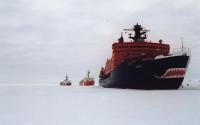U.S. lags behind arctic nations in race to stake claims to untapped resources

Countries are scrambling to stake claim to untapped resources, previously frozen in the Arctic. But with a lack of basic infrastructure and funding commitments, critics say the U.S. trails other countries in preparations for the increased activity in the north.
Quicktabs: News
-
By remaining outside of UNCLOS, the U.S. is ceding its leadership role in the region in a number of ways. First, and most importantly for the U.S. strategic and economic interests, by remaining outside of the treaty the U.S. is not able to submit its claims for the extended continental shelf in the Arctic to the CLCS, preventing U.S. industries from claiming mineral rights. Secondly, existing Arctic governance regimes are based on and rely on UNCLOS and the U.S. non-party status prevents it from contributing as a full partner, weakening the overall Arctic governance regime. Finally, U.S.
Keywords:Related Quotes:- U.S. is being left behind in race for the Arctic as a non-party to UNCLOS
- U.S. has limited time to ratify convention to secure access to Arctic resources
- U.S. national interest harmed by remaining outside UNCLOS regime and unable to take advantage of Arctic boom
- U.S. should make ratification of UNCLOS a top priority to ensure it doesn't lose out on opening of Arctic
- ... and 36 more quote(s)
Parent Arguments:Supporting Arguments:- U.S. has significant interests in untapped mineral wealth in Arctic
- Other nations are pursuing Arctic claims to the detriment of the U.S.
- U.S. failure to ratify UNCLOS complicates U.S. naval operations in the Arctic
- UNCLOS is best regime for Arctic Governance
- U.S. can't secure claims to Arctic resources through CLCS as a non-party to UNCLOS
- Russia poses a strategic threat to the U.S. in the Arctic
Counter Argument:
